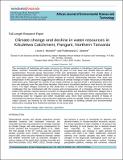Climate change and decline in water resources in Kikuletwa Catchment, Pangani, Northern Tanzania
Abstract
The sensitivity of hydrology and water resources to climate variation in Kikuletwa Catchment, Pangani
Basin, northern Tanzania was assessed using 30 years of river level and climate data as well as
questionnaire, focused group discussion (FGD) and participant observation. The results show a
significant association between mean annual river level for Kikuletwa River and mean annual rainfall in
the past thirty years. The results further indicate an inverse relationship between river level and
temperature in the catchment suggesting the effects of climate change on water resources at Kikuletwa
Catchment area. Although the results of our study indicate an upward trend in precipitation (from the
two rain stations) over the past three decades, there was a consistent decline in river level in the main
rivers. The eight villages covered by this study face a variety of water shortage and environmental
challenges that are intertwined with the causes and consequences of a changing climate. Access to
water is the primary natural resource concern in Pangani Basin and Kikuletwa catchment villages and a
lack of infrastructure for storing and directing water during rainy periods limits opportunities for
harvesting water for irrigation and other household uses. More than seventy percent of heads of
household are farmers whose crop production depends mainly on rainfall. While water deficit remains a
major concern, its severity is not immune to the challenges of shifting climate and environmental
destruction resulting from livelihood activities in the study area.

